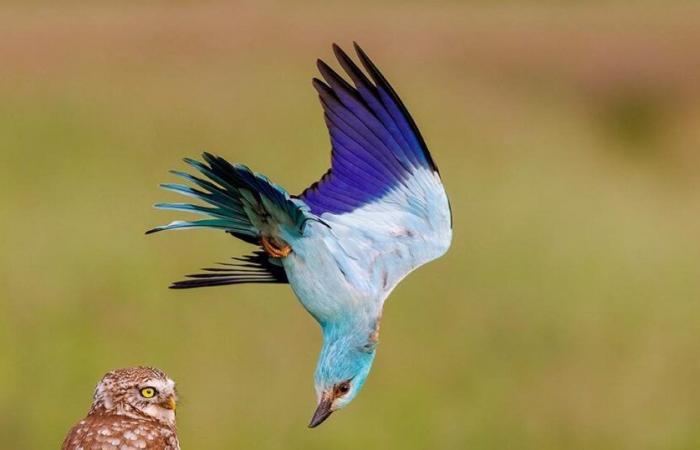The Wildlife Photographer of the Year 2024, awarded by the Natural History Museum in London, has revealed the 25 photos selected for the 2024 “People’s Choice” category.
Last October the famous wildlife photography competition announced the winners of the Wildlife Photographer of the Year 2024. Shane Gross won the wildlife photographer of the year prize, thanks to his school of tadpoles and toads.
The choice of people around the world
This time, the Natural History Museum in London, organizer of this annual competition, has announced the finalists of the Audience Award : 25 photographs selected from 59,228 applications, coming from 117 countries and territories. Two French people are in the running this year.
Douglas Gurr, director of the Natural History Museum, said: “ The People's Choice Award allows audiences around the world to join the jury and vote for the winning image, encouraging everyone to connect with the natural world. As always, this year's selection of images for the sixtieth anniversary of the competition is truly exceptional, and we can't wait to see which one is chosen as the public's favorite !».
The public can vote on the website for their favorite photograph until Wednesday January 29, 2025. The winner will be known in February 2025.
Puma, pack of wolves, epic duel between a honeyrattle and a porcupine, underwater hunting between a polar bear and a fulmar, meeting between a white crane and a curious biologist, landscape of the Villarrica volcano in Chile… A magnificent visual spectacle for all tastes.
The finalist photos
«The Brave Gecko», Willie Burger van Schalkwyk (Afrique du Sud)
Willie van Schalkwyk / Wildlife Photographer of the Year
An unequal fight. The courageous giant ground gecko tries to resist against a goshawk, a large predator. If the final outcome was unsurprising, the bravery of the little samurai gecko impressed the photographer.
«Scanning the Realm”, Aaron Baggenstos (United States)
Aaron Baggenstos / Wildlife Photographer of the Year
The photograph of this puma is a symbol of hope. It illustrates more peaceful relations between these carnivorous mammals and sheep breeders, thanks to a successful conservation movement, which allowed the creation of the Torres del Paine National Park and the growth of ecotourism in this mountainous region of Chile .
«Meeting in the Marsh”, Michael Forsberg (United States)
Michael Forsberg / Wildlife Photographer of the Year
A strange encounter immortalized in the swamp in Louisiana (United States). This camouflage outfit, used by a biologist, was intended to be able to approach a whooping crane, an endangered species in Louisiana. Quickly, the scientist was able to check the health of the animal and change the faulty transmitter, which makes it possible to collect information and learn more about these non-migratory birds.
«Wolf Pack», Arvind Ramamurthy (India)
Arvind Ramamurthy / Wildlife Photographer of the Year
One after the other these 5 wolves came to sit on the edge of an agricultural crop, while they were playing in grassy fields in India. The number of individuals has fallen in the country due to the fragmentation of rolling grasslands and the risk of contracting diseases from eating livestock carcasses.
«Slap Shot”, Savannah Rose (United States)
Savannah Rose / Wildlife Photographer of the Year
This beaver tapped the surface of the water with its tail to warn its clan of the presence of an intruder, in this case the photographer. A pretty immortalized droplet effect. If the beavers do not sense any danger, they then return to the normal course of their little lives.
«Icy Repose”, Sue Flood (UK)
Sue Flood / Wildlife Photographer of the Year
It was from an inflatable boat in the port of Neko, on the Antarctic Peninsula, that Sue Flood admired and observed this very relaxed Weddell seal.
«A Good Scratch», Mark Williams (Royaume-Uni/Canada)
Mark Williams / Wildlife Photographer of the Year
But what is this beluga doing in a river in Canada? He simply rubs his stomach to exfoliate his skin. Everyone has their own little beauty secrets.
«Fallen from the Sky», Carlo D’Aurizio (Italie)
Carlo D’Aurizio / Wildlife Photographer of the Year
This photo, reminiscent of a still life, was taken on a summer morning in the San Bartolomeo Valley, in the Majella National Park, in Italy. Photographer Carlo D'Aurizio cannot explain this massacre of insects (including many butterflies), which died in this watercourse.
«Spiked», David Northall (Royaume-Uni)
David Northall / Wildlife Photographer of the Year
First round: in Botswana, this cousin of the badger attacked a porcupine, usually nocturnal, which in defending itself bloodied its predator with its quills.
Second round: the pugnacious and ferocious ratel returned to the charge a little later, killing its prey before taking it to its lair.
«Sneak Attack”, Erlend Haarberg (Norway)
Erlend Haarberg / Wildlife Photographer of the Year
His mother and his brother (or his sister, the story does not tell!) were feeding on a walrus carcass in Spitsbergen. This polar bear cub preferred to play in the water with the algae, before attacking, on several occasions, this northern fulmar, which was resting on the water. The large predator failed in his playful hunt but this experience will certainly be useful to him because when he is emancipated from his mother, he will have to feed and survive alone.
«Togetherness”, Ivan Ivanek (Czech Republic)
Ivan Ivanek / Wildlife Photographer of the Year
Mating of two primates, sweet langurs with red coats. This species, which lives only in Vietnam, Laos and Cambodia, is critically endangered. The cause is the disappearance of its habitat, hunting and the illicit pet trade.
«Concert in the Forest», Vincent Premel (France)
Vincent Premel / Wildlife Photographer of the Year
This frog does not want to become bigger than the ox, it puffs up its cheeks to call for a partner. Its cry is particularly powerful: it can be heard hundreds of meters away.
«Aspen Shadows”, Devon Pradhuman (United States)
Devon Pradhuman / Wildlife Photographer of the Year
The American photographer froze this pack of wolves in a minimalist landscape of bare aspens and snow. These 4 individuals, in search of food, then disappeared on the side of the hill.
«Forest of Dreams», Samuel Bloch (France)
Samuel Bloch / Wildlife Photographer of the Year
Curiously, the photographer encountered this northern giant petrel, sitting in its nest, on the edge of a forest, on Enderby Island, New Zealand, although this species is a large seabird. certainly came to breed on an island frequented by fewer predators.
«Whiteout”, Michel d’Oultremont (Belgium)
Michel d’Oultremont / Wildlife Photographer of the Year
White on white. Not easy to spot, this ermine is at the bottom left of the photo. According to the photographer, curious, she came out of her snowy hole and stood up from time to time to observe her territory, before going hunting.
«Snuffling Sengi», Piotr Naskrecki (Pologne)
Piotr Naskrecki / Wildlife Photographer of the Year
At dusk and dawn, this small four-toed insectivorous mammal searches for food under the leaves, using a good sense of smell and good vision. As the sengi is fearful and shy, Piotr Naskrecki had to set up his camera remotely to be able to photograph it.
«Earth and Sky», Francisco Negroni (Chili)
Francisco Negroni / Wildlife Photographer of the Year
The Wildlife photographer of the year also gives pride of place to landscapes and nature. Here, the Villarrica volcano, in southern Chile. It is one of the most active in the country.
«Drifting Dinner», Noam Kortler (Israel)
Noam Kortler / Wildlife Photographer of the Year
A crab perches on an ascidian to search the water, looking for drifting plankton. Photograph taken during a night dive.
«Edge of Night», Jess Findlay (Canada)
Jess Findlay / Wildlife Photographer of the Year
Strange sensation, ghostly vision. This barn owl comes out of the window of a hayloft, an abandoned barn, to go hunting near Vancouver, Canada.
«Evening Song», Christian Brinkmann (Allemagne)
Christian Brinkmann / Wildlife Photographer of the Year
This artistic photograph shows a blackbird singing in front of the lights of the funfair in Münster.
«Curious Connection”, Nora Milligan (United States)
Nora Milligan / Wildlife Photographer of the Year
Who is watching who? Neck tilted forward, eyes wide, this large male chimpanzee seems just as captivated by the lens as the photographer by his subject.
«The Arrival», Brad Leue (Australie)
Brad Leue / Wildlife Photographer of the Year
This shot, showing floodwaters surging towards a huge salt lake, was photographed from a helicopter in high winds. A great technical feat, for a breathtaking result.
«No Access», Ian Wood (Royaume-Uni)
Ian Wood / Wildlife Photographer of the Year
This badger, lit by a street lamp, seems to be looking at graffiti depicting a fellow badger on a road in St Leonards-on-Sea, England. What could have been going through his head at that precise moment?
«Unsold», Jose Fragozo (Portugal)
Jose Fragozo / Wildlife Photographer of the Year
The prestigious photographic competition is also an opportunity to raise awareness about illegal wildlife trafficking. This little cheetah, captured in its native plains in the Somali region, is waiting to be sold in Ethiopia.






